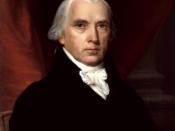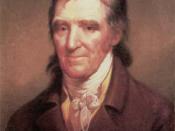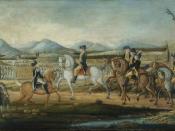In the 1790s, American society was split in half. On one side there was Alexander Hamilton, who believed in a strong central government and that the future of America lied in manufacturing and strong businesses. Opposing him was Thomas Jefferson, who believed America's strength should come from its states. He foresaw a nation of small and independent farmers, where the government would not need to become directly involved in the daily affairs of the citizens. The establishment of the Bank of the United States and conflicts such as the Whiskey Rebellion were the result of these two contrasting views. The country faced many major decisions in other areas because of the French Revolution and the foreign debts that America owed as a result of the Revolutionary War. The French Revolution heated political arguments that ultimately shaped American politics in the 1790s because it was a catalyst for future events such as the enactments of the Alien and Sedition Acts, and the Kentucky and Virginia Resolutions, which stimulated the need for Civil War.
The French Revolution started in 1789. In 1793, George Washington issued the Neutrality Proclamation, proclaiming the United States's official neutrality. Washington knew that war could be disastrous for the country since the United States was militarily and economically weak. Although starting out with high ideals, the revolution in France soon became bloody. The Federalists opposed the revolution while the Democratic-Republicans still supported France, mainly because it was fighting the British and saw it as a model of the American Revolution.
One drastic effect of the French Revolution on American politics was the passing of the Alien and Sedition Laws. Although generally viewed as unconstitutional, the Alien and Sedition Laws were upheld by the Federalists in power at the time. The law was written to expire by 1801...


